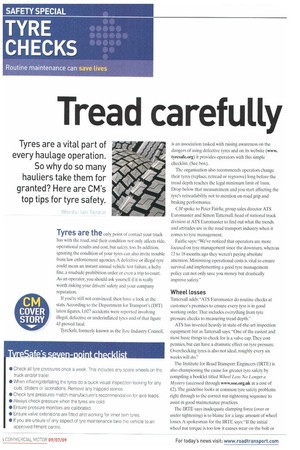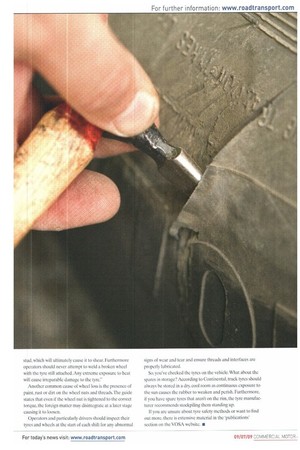Tread carefully
Page 46

Page 47

If you've noticed an error in this article please click here to report it so we can fix it.
Tyres are a vital part of every haulage operation. So why do so many hauliers take them for granted? Here are CM's top tips for tyre safety.
Tyres are the only point of contact your truck has with the road, and their condition not only affects ride, operational results and cost, but safety, too. In addition, ignoring the condition of your tyres can also invite trouble from law enforcement agencies. A defective or illegal tyre could mean an instant annual vehicle test failure, a hefty fine, a roadside prohibition order or even a trip to court. As an operator, you should ask yourself if it is really worth risking your drivers' safety and your company reputation.
If you're still not convinced, then have a look at the stats. According to the Department for Transport's (DtT) latest figures, 1,027 accidents were reported involving illegal. defective or underinflated tyres and of that figure 43 proved fatal.
TyreSafe, formerly known as the Tyre Industry Council, is an association tasked with raising awareness on the dangers of using defective tyres and on its website (www. tyresafe.org) it provides operators with this simple checklist. (See box).
The organisation also recommends operators change their tyres (replace, retread or regroove) long before the tread depth reaches the legal minimum limit of lmm. Drop below that measurement and you start affecting the tyre's retreadability not to mention on-road grip and braking performance.
CM spoke to Peter Fairlie, group sales director ATS Euromaster and Simon Tattersall, head of national truck division at ATS Euromaster to find out what the trends and attitudes are in the road transport industry when it comes to tyre management.
Fairlie says: We've noticed that operators are more focused on tyrc management since the downturn, whereas 12 to 18 months ago they weren't paying absolute attention. Minimising operational costs is vital to ensure survival and implementing a good tyre management policy can not only save you money but drastically improve safety."
Wheel losses
Tattersall adds: "ATS Euromaster do routine checks at customer's premises to ensure every tyre is in good working order:That includes everything from tyre pressure checks to measuring tread depth."
ATS has invested heavily in state-of-the-art inspection equipment but as Tattersall says: "One of the easiest and most basic things to check for is a valve cap. They cost pennies, but can have a dramatic effect on tyre pressure. Overchecking tyres is also not ideal, roughly every six weeks will do."
The Institute for Road Transport Engineers (IRTE) is also championing the cause for greater tyre safety by compiling a booklet titled Wheel Loss No Longer a Mystery (accessed through wwwsoe.org.uk at a cost of £2). The guideline looks at common tyre safety problems right through to the correct nut-tightening sequence to assist in good maintenance practices.
The IRTE says inadequate clamping force (over or under tightening) is to blame for a large amount of wheel losses. A spokesman for the IRTE says: "If the initial wheel nut torque is too low it causes wear on the bolt or stud, which will ultimately cause it to shear. Furthermore operators should never attempt to weld a broken wheel with the tyre still attached. Any extreme exposure to heat will cause irreparable damage to the tyre."' Another common cause of wheel loss is the presence of paint. rust or dirt on the wheel nuts and threads. The guide states that even if the wheel nut is tightened to the correct torque, the foreign matter may disintegrate at a later stage causing it to loosen.
Operators and particularly drivers should inspect their tyres and wheels at the start of each shift for any abnormal signs of wear and tear and ensure threads and interfaces are properly lubricated.
So, you've checked the tyres on the vehicle. What about the spares in storage? According to Continental, truck tyres should always be stored in a dry, cool room as continuous exposure to the sun causes the rubber to weaken and perish. Furthermore, if you have spare tyres that aren't on the rim, the tyre manufacturer recommends stockpiling them standing up.
If you are unsure about tyre safety methods or want to find out more, there is extensive material in the 'publications' section on the VOSA website. •












































































































































